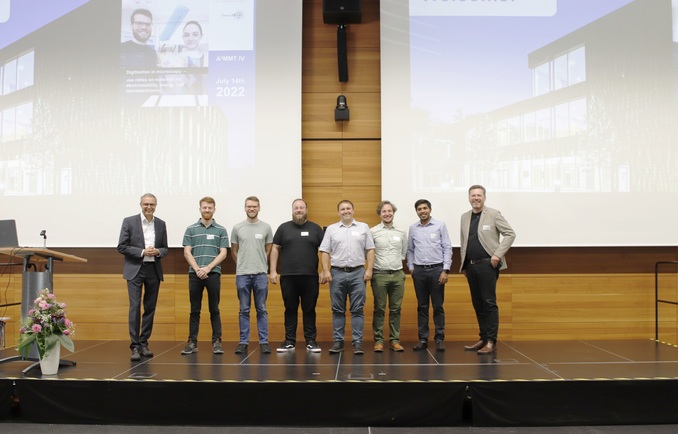International Conference on Digitalization in MicroscopyThe fourth Aalen Materials Microscopy Day at Aalen University was dedicated to the exchange between research and industry

The speakers at the fourth Aalen Materials Microscopy Day (from left to right): Prof. Dr. Gerhard Schneider, Matias Volman Stern, Patrick Krawczyk, Andreas Jansche, Dr. Matt Andrew, Prof. Dr. Rich Johnston as well as Amit Kumar Choudhary and Dr. Timo Bernthaler. Photo: Julian Schurr
Digitalization is ever-present. It also offers immense potential to microscopy, which was addressed by around 90 experts from industry and research at the fourth Aalen Materials Microscopy Day in the auditorium of Aalen University. The host of the conference was the Institute for Materials Research at Aalen University (IMFAA). In technical presentations and discussion sessions, participants exchanged ideas on the latest findings and methods in digital microscopy with a special focus on electromobility, renewable energies and microelectronics.
Artificial intelligence (AI) that autonomously evaluates images from high-resolution scanning electron microscopes, finding tiny defects in components, recognizing potential for improvement in materials for energy technology and sustainable mobility, and that continues learning; what sounds like science fiction has long been the order of business in microscopy and materials research, as well as in everyday use in industry.
There is a close correlation between the gain in knowledge in materials research, the development of ever-smarter materials and products, and the increased use of machine learning methods to evaluate the data generated in the process. "In this symposium, we wanted to show what digitalization can do for the fields of renewable energies, electrification and autonomous systems on the way to the society of the future," said Prof. Dr. Gerhard Schneider from the hosting management team from Aalen.
The range of topics covered by the distinguished speakers from Europe and overseas highlighted the diverse applications of AI in microscopy. For example, Prof. Dr. Rich Johnston from Swansea University in the United Kingdom gave an insight into his team's research work in his presentation "Multimodal 3D characterization of carbon-based perovskite solar cells" before Prof. Dr. Gerhard Schneider and Dr. Timo Bernthaler from IMFAA addressed the opportunities that machine learning offers to materials research from different perspectives.
Dr. Peter Czurratis, Managing Director of PVA TePla Analytical Systems GmbH in Westhausen, showed how algorithms are used in defect analysis for semiconductors. "Artificial intelligence evaluates recordings from high-resolution acoustic microscopes in this non-destructive testing process," he explained. Dr. Matt Andrew of Carl Zeiss Microscopy, based at the Zeiss Innovation Center California in the U.S., explained how barriers to speed and resolution in 3D tomography image reconstruction can be overcome thanks to AI and deep-learning methods.
Exciting ideas were also provided by Matias Volman Stern from Matworks GmbH in Aalen, who reported on the FA 4.0 research project: "In cooperation with four other European countries, we are researching the use of intelligent, AI-based tools to ensure reliable electronic devices for smart mobility and industrial production." Further interesting insights into their research were provided by the PhD students of the IMFAA Machine Learning team Amit Kumar Choudhary, Andreas Jansche and Patrick Krawczyk. Finally, Andreas Kopp and Tim Schubert, also researchers at IMFAA, gave a tour of the research building at Aalen University. They presented research in the areas of batteries, magnets, additive manufacturing, materialography and laser materials processing directly on-site in the laboratories as well as on the four-axis test rig.
Info:
The Institute for Materials Research Aalen at Aalen University (IMFAA) specializes in the production, characterization and testing of materials and components. The focus is on advanced materials and components for resource-efficient mobility, renewable energy, additive manufacturing, and machine learning in microscopy and component inspection. More information about research at IMFAA is available here. The institute is located at the School of Mechanical Engineering and Materials Science at Aalen University and cooperates with other institutes and facilities of the Cooperation Network SmartPro funded by the Federal Ministry for Education and Research.
